
Every classroom is a microcosm of the wider world—a place where students with different backgrounds, experiences, and identities come together to learn and grow. When educators are intentional about teaching diversity in the classroom, they help create spaces where all students feel seen, valued, and safe to be themselves.
At Soul Shoppe, we believe inclusion begins with compassion, understanding, and a willingness to see each student’s unique brilliance. It’s not just about acknowledging what is diversity—it’s about celebrating it in action.
What is diversity?
When we define diversity in the classroom, we’re talking about more than race, ethnicity, or language—though it does include those differentiators. Types of diversity in the classroom also include:
- Learning styles and abilities
- Socioeconomic backgrounds
- Family structures
- Gender identities and expressions
- Neurodiversity
- Religious beliefs
- Life experiences
Cognitive diversity in the classroom—how students think, solve problems, and view the world—enriches discussion and opens up multiple pathways to learning.
Why is diversity in the classroom important?
The importance of diversity in the classroom goes beyond representation. Students who feel accepted are more likely to:
- Engage in class
- Feel confident expressing themselves
- Show empathy and collaboration
- Develop leadership and social skills
Studies also show that classrooms rich in diversity and education improve critical thinking and reduce bias. When children grow up learning in diverse environments, they carry those lessons into the world, building more inclusive communities as adults.
Simple, everyday ways to celebrate differences
You don’t need grand gestures to create a diverse classroom. It’s often the small, consistent actions that make the biggest impact. Here are practical ways to weave inclusion into daily routines:
1. Use inclusive language
From morning greetings to classroom directions, language matters. Celebrate students’ names and identities with care. This reinforces that everyone belongs.
2. Highlight diverse voices and stories
Representation in books, posters, and lessons helps students see themselves—and others—as part of the narrative. Use diversity in the classroom examples through literature, history, and media.
3. Encourage curiosity, not assumptions
Create a classroom where students feel safe asking respectful questions and exploring differences. Teach them to say, “Tell me more” instead of assuming they understand someone else’s experience.
4. Acknowledge holidays and traditions
From Lunar New Year to Juneteenth to Día de los Muertos, recognize and honor a wide range of cultural celebrations. Let students share how they and their families observe meaningful traditions.
Inclusion in the classroom through SEL
Social emotional learning (SEL) gives students the tools to practice empathy, resolve conflict, and build positive relationships—foundations of an inclusive learning environment.
Soul Shoppe’s Respect Differences program directly supports teaching diversity in the classroom. It encourages:
- Acceptance of others
- Curiosity over judgment
- A culture of shared responsibility
Likewise, our Elementary SEL curriculum Tools of the Heart integrates emotional intelligence, active listening, and perspective-taking into the everyday classroom experience. These lessons help nurture inclusive spaces where kindness and community thrive.
Explore more about our full approach to social emotional learning.
Activities to promote diversity in the classroom
Let students explore their identities, and the identities of others, through engaging, thoughtful activities.
Identity Shields
Have students create a personal “identity shield” showing the things that make them who they are—family, interests, heritage, and more. Discuss what makes each shield unique and special.
Story Circles
Encourage students to share stories about a time they felt different, or a time they learned something new about someone else. This activity builds empathy and understanding.
“I See You” Affirmations
End each week with students giving one another kind affirmations that reflect appreciation for differences. For example: “I noticed how you shared your culture during our project. That was brave and cool!”
Teaching diversity in a way that feels real

Sometimes, conversations about diversity in schools can feel abstract. What makes the biggest difference is when inclusion in the classroom becomes part of the culture, not just a topic for special months or lessons.
That means:
- Making space for every student’s voice
- Responding to exclusion with curiosity and learning, not blame
- Reflecting and adjusting when something isn’t working
- Involving families and community perspectives
The long-term impact of diversity in the classroom
A positive classroom climate grounded in diversity helps students thrive—not just academically, but emotionally and socially. They become:
- More self-aware
- Better communicators
- More capable of working with others from different walks of life
This is the impact of diversity in the classroom: a ripple effect that shapes how children see themselves, each other, and the world around them.
Final thoughts: A place where everyone belongs
Teaching diversity in the classroom isn’t about perfection. It’s about presence, awareness, and the willingness to learn alongside your students.
At Soul Shoppe, we believe every child deserves to feel known and respected. Through programs like Respect Differences and Tools of the Heart, we help educators build classrooms where everyone belongs—and where every student grows into their full, unique self.
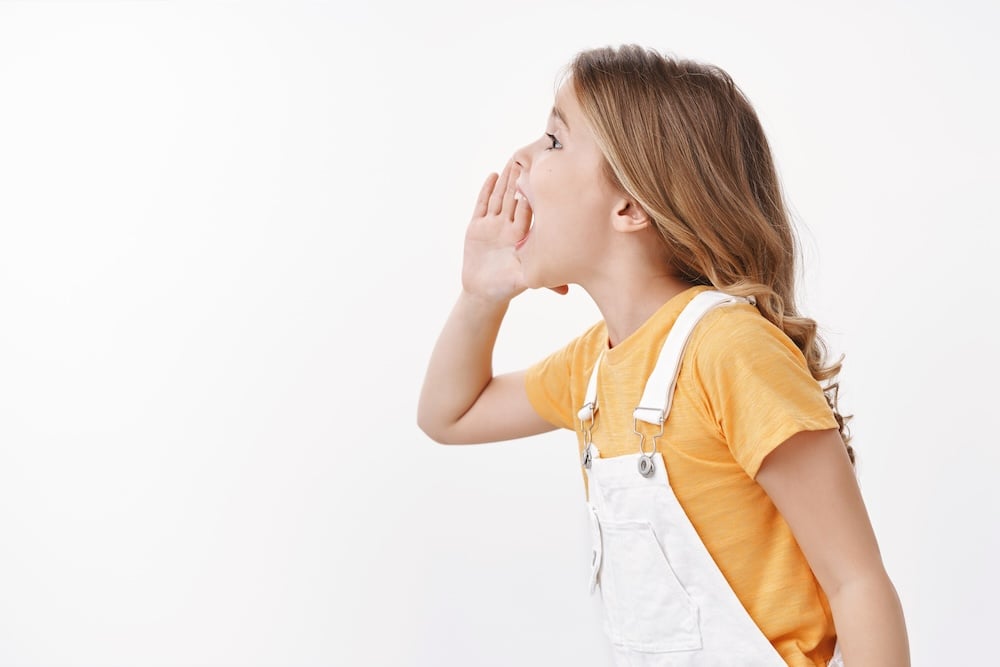
As children grow into their voices and identities, they start to test how they can communicate their needs. In these moments, it’s important to help them understand the difference between assertiveness vs. aggressiveness. While both may appear confident on the surface, they carry very different intentions and impacts.
At Soul Shoppe, we believe that teaching students to express themselves respectfully and clearly is essential for building inclusive classrooms and lifelong social-emotional skills. Let’s explore how to support students in speaking up, without overpowering others.
What is the difference between assertiveness and aggressiveness?
Children often confuse being assertive vs. aggressive, especially when they’re learning how to stand up for themselves. At a glance, both behaviors might seem like forms of speaking boldly. But understanding the difference between aggressive and assertive behavior helps students learn how to express their needs while also showing respect for others.
| Behavior |
Definition |
Focus |
Impact |
| Assertiveness |
Clear, respectful communication of one’s thoughts and needs |
Self-respect and mutual respect |
Builds trust, encourages collaboration |
| Aggressiveness |
Forceful, sometimes hurtful expression that violates others’ boundaries |
Control or dominance |
Causes fear, resistance, or conflict |
When children understand this distinction of aggressive vs. assertive communication, they can practice it in real-life scenarios, especially when things get tense.
Teaching assertiveness in the classroom
Assertiveness is a skill, and like all skills, it needs to be taught, modeled, and practiced. Here’s how to begin:
1. Define it with age-appropriate examples
Give clear, relatable examples of what being assertive sounds like:
- “Please stop, I don’t like that.”
- “I’d like a turn when you’re done.”
- “I feel left out. Can I join you?”
Contrast this with aggressive phrases:
- “Stop it now or I’ll tell!”
- “Move! That’s mine!”
- “You’re being mean!”
Helping students reflect on the difference between assertiveness and aggressiveness builds both empathy and self-awareness.
2. Use role-play and scenarios
Practice makes it real. Create assertiveness vs. aggressiveness role-play activities where students choose how to respond in common social situations. Let the class reflect on how each response feels, for both the speaker and the listener.
3. Model respectful expression
Students learn what they see. When adults calmly and clearly assert themselves, especially during moments of disagreement, students learn that respect and strength can go hand in hand.
Soul Shoppe tools that support assertiveness
We integrate assertiveness training into many of our social-emotional learning resources to help students express their needs and resolve conflict peacefully.
- Peace Path: This tool walks students through conversations about feelings, needs, and boundaries in a structured way, modeling respectful dialogue.
- Peacemaker Training: Designed to give educators and students alike the tools for assertive conflict resolution, this training empowers students to become community leaders.
- Elementary SEL curriculum: A foundation for teaching emotional intelligence, empathy, and effective communication in every classroom.
Each of these resources help students develop emotional literacy, build strong relationships, and speak up from a place of calm clarity.
Activities to practice assertive communication
Use these classroom activities to reinforce assertive vs. aggressive communication:
“Say It with Respect”
Give students sticky notes with different phrases and have them identify which are assertive and which are aggressive. Then, challenge them to rephrase the aggressive ones using assertive language.
Feelings & Needs Circles
Invite students to share a time when they had a need that wasn’t met. Use sentence starters like “I felt ___ because I needed ___.” This teaches kids how to express needs directly, a key part of assertiveness.
“Voice Volume” Meter
Use a visual scale (e.g., whisper, calm voice, shout) to help students monitor how they’re communicating. This helps them associate calm, firm speech with assertiveness.
Helping students navigate emotional triggers
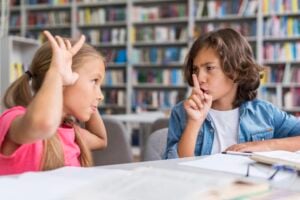 Often, aggressive communication is a reaction to strong emotions like anger, embarrassment, or fear. When we address the emotion underneath, we can support students in shifting from reactivity to intention.
Often, aggressive communication is a reaction to strong emotions like anger, embarrassment, or fear. When we address the emotion underneath, we can support students in shifting from reactivity to intention.
Here’s how to support that:
- Normalize big feelings and teach calming techniques before responding (like breathing or taking a moment).
- Encourage students to notice how their body feels when they’re upset—this is the first step to choosing how to respond.
- Validate the need or feeling while guiding them to a more respectful way of expressing it.
Soul Shoppe’s Social Emotional Learning programs help students build these self-awareness muscles over time.
Why it matters: long-term benefits of assertiveness
Children who learn to be assertive without being aggressive tend to:
- Form stronger friendships
- Set healthy boundaries
- Resolve conflicts more peacefully
- Feel more confident expressing their needs
These are lifelong skills. When we make space for this kind of learning in our classrooms, we’re not just reducing conflict—we’re cultivating future leaders who lead with integrity.
Final thoughts: teaching voice and respect
Helping students navigate assertiveness vs. aggressiveness is about more than classroom behavior. It’s about giving them the tools to honor themselves and others at the same time. By practicing respectful communication, learning to manage big emotions, and embracing self-expression, students grow into thoughtful, confident communicators.
Using tools like the Peace Path and programs like Peacemaker Training, we can teach assertiveness not as dominance, but as a balanced, respectful, and empowered voice.
You May Also Like:
Teaching Children About Reading Social Cues
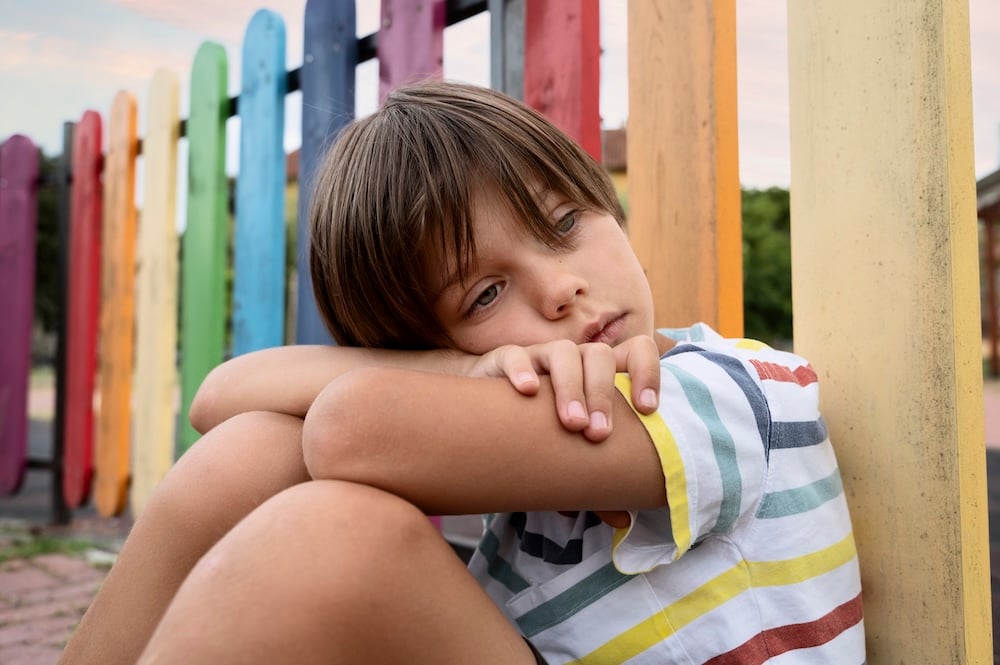
Forgiveness is one of the most powerful tools we can teach children, not as a rule they must follow, but as a skill they can develop. Teaching kids forgiveness gives them the emotional tools to move forward after conflict, disappointment, or hurt. When we approach forgiveness not just as a moral directive but as a healing practice, we open the door to empathy, accountability, and growth.
Forgiveness isn’t about forgetting or excusing poor behavior. It’s about helping kids understand how to navigate complicated emotions, restore relationships, and continue building a supportive community. In this post, we’ll explore practical ways to begin teaching forgiveness and offer supportive strategies for what comes next, because forgiveness is only part of the journey.
Why teaching kids forgiveness matters
When a child feels wronged by a classmate, sibling, or even an adult, the emotional fallout can be confusing. They might hold onto resentment or feel unsure about how to respond. That’s where teaching forgiveness activities come into play.
Through object lessons on forgiveness, group discussions, and reflective practices, students begin to see forgiveness not as weakness but as strength. Forgiveness supports:
- Emotional regulation and healing
- Restoring peer connections after conflict
- Reduced classroom tension
- Growth in empathy and accountability
This is especially important in school settings where relationships are constantly forming, shifting, and sometimes breaking. A foundation in social emotional learning gives students the skills to manage these experiences thoughtfully.
Forgiveness is not a one-time event
Many children believe forgiveness means pretending something never happened. But when we take the time to explore how to teach kids forgiveness, we can model that forgiveness is a process—one that involves naming hurt, taking responsibility, and creating space to heal.
Forgiveness also doesn’t guarantee the relationship returns to what it was. And that’s okay. Children can learn to forgive and still set boundaries.
To help students walk through this process, educators can use the Peace Path, a simple yet effective tool that guides students through restorative conversations. It fosters accountability and makes space for forgiveness in an age-appropriate way.
Activities to teach forgiveness in the classroom
Looking for ways to incorporate activities to teach forgiveness into your daily classroom flow? Here are some ideas that gently introduce the concept and help students practice:
1. Forgiveness journal
Have students write about a time they felt hurt. What happened? How did they respond? How would they like to move forward? This activity builds emotional literacy and perspective-taking.
2. “Let it go” balloon activity
Inspired by Soul Shoppe’s Empty Balloon Exercise, students can write a hurt or grudge on a small piece of paper, place it inside a balloon, inflate it, and then pop it as a symbolic release.
3. Forgiveness craft
Create “forgiveness cards” with students—cards they can write when they’re ready to make amends or express forgiveness to a peer. These can be used voluntarily and kept private.
4. Games that teach forgiveness
Conflict resolution games—like role-playing apology and forgiveness scenarios—can help kids practice without the emotional weight of a real disagreement. Explore our full collection of activities through the Peacemaker Training, which gives educators a full toolkit for resolving conflict through empathy and repair.
Examples and scenarios: making forgiveness real
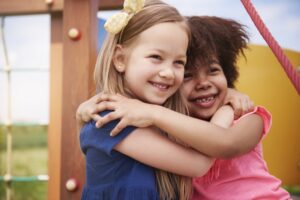
Here are a few forgiveness scenarios students may encounter:
- A friend says something unkind during recess.
- A peer refuses to share supplies during group work.
- Someone excludes them from a game or lunch group.
These may seem minor, but to students, they can feel deeply personal. Teaching forgiveness through real-life situations helps students process and respond in ways that maintain their emotional integrity.
By linking these moments to growth mindset and emotional regulation skills from our Elementary SEL Curriculum, students learn that relationships can mend—and even grow stronger—after rupture.
What happens after forgiveness?
After a child chooses to forgive—or is forgiven—there’s often still emotional residue. They may feel uncertainty, anxiety, or hope. Adults can help by naming this and supporting post-forgiveness healing.
Some things to remind students:
- Forgiveness is not approval of harmful behavior.
- It’s okay to take time before feeling ready.
- Setting boundaries after forgiveness is a healthy next step.
Adults can guide students through these stages using empathy tools, reflective writing, and gentle check-ins. And, of course, by modeling forgiveness in their own interactions.
Supporting forgiveness through Soul Shoppe
Forgiveness becomes more accessible when it’s part of the larger culture of the classroom. At Soul Shoppe, we believe in building schools where compassion and accountability go hand in hand. Our programs support this through:
- Peace Path: A structured framework for conflict resolution.
- Peacemaker Training: SEL-focused training that equips schools with tools to guide peer mediation and peaceful problem-solving.
- Social Emotional Learning: The foundation of our programs, designed to help kids understand emotions, build healthy relationships, and thrive.
By making forgiveness part of daily SEL practice, we prepare students to navigate life’s challenges with grace and connection.
Forgiveness is a skill for life
Teaching kids forgiveness isn’t just about fixing classroom conflicts. It’s about equipping young people with the tools to process hurt, express empathy, and rebuild trust throughout their lives. From a simple forgiveness craft to transformative conflict resolution practices, students thrive when they’re given the chance to understand forgiveness from a place of strength and choice.
With the right support, guidance, and tools like Soul Shoppe’s Peace Path and Peacemaker Training, students become not just more peaceful but more powerful, resilient, and connected.
You May Also Like:
Boundaries Activities for Kids
Teaching Assertiveness vs. Aggressiveness
Teaching Diversity in the Classroom
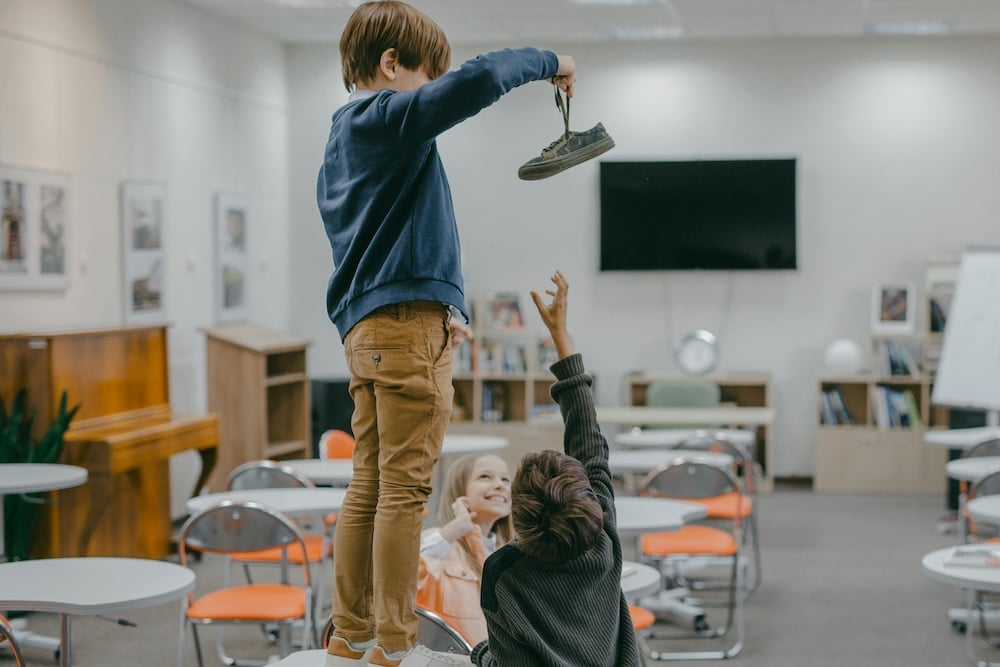
When students act out or withdraw, it can be easy to label their actions as misbehavior. But behind every challenging behavior is a deeper story—a need that isn’t being met or an emotion that’s difficult to express. As educators and caregivers, the opportunity is not in reacting with punishment, but in responding with curiosity, connection, and tools that nurture emotional growth.
This is the heart of social emotional learning, and the shift it encourages in how we view challenging behaviors in the classroom. This shift can change lives, both for students and for the educators who guide them.
What are challenging behaviors?
Challenging behaviors can take many forms: defiance, outbursts, shutting down, refusal to participate, aggression, or even excessive silliness. While some challenging behavior examples may appear disruptive, others are more subtle but still indicate a need for support.
The key is recognizing that these behaviors are communication.
Whether a child is feeling overwhelmed, unheard, unsafe, or simply dysregulated, their behavior is often the visible signal of something deeper happening within.
From control to connection: Reframing the response
Traditional discipline methods often focus on control—timeouts, detentions, or rewards and consequences. These strategies may suppress behavior in the short term, but they don’t address the root cause.
Shifting to a connection-based approach means we start by asking: Why is this behavior showing up right now?
Curiosity opens the door to understanding, while connection provides the safety kids need to learn new skills. This doesn’t mean excusing the behavior, but rather guiding students through it with compassion, boundaries, and tools for self-regulation.
How to deal with challenging behaviors in the classroom
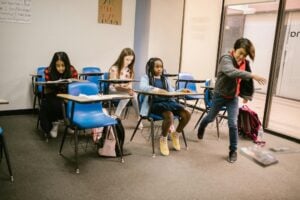
Here are practical ways to shift your approach to managing challenging behaviors:
1. Lead with empathy
Before responding, pause. Ask yourself what the child might be feeling or needing. A regulated adult helps regulate the child.
2. Name the emotion
Help students identify what they’re feeling. “You seem frustrated. Do you want to talk or take a break?” Naming emotions helps kids develop emotional literacy.
3. Offer choice
When students feel powerless, giving small, meaningful choices can restore a sense of control in healthy ways.
4. Use connection tools
Use community agreements, check-ins, and mindfulness tools like Tools of the Heart to reconnect students with their values and calm their nervous systems.
5. Create safe spaces for regulation
A cozy corner, a peace table, or a sensory box can give students a place to cool down and return to the group when ready.
Understanding the roots: Why behaviors show up
Understanding how to handle challenging behavior in the classroom means tuning into the reasons these behaviors arise. Some common causes include:
- Unmet needs (hunger, sleep, overstimulation)
- Stress or trauma
- Learning differences
- Social struggles or a lack of skills
- Feeling disconnected or misunderstood
By seeing challenging behaviors as signals rather than defiance, educators can respond with intention and help students build the skills they need to succeed.
Teaching through behavior: Opportunities for growth
Moments of dysregulation are also moments of opportunity. They’re a chance to teach:
- Self-awareness (What am I feeling?)
- Self-regulation (What can I do with this feeling?)
- Empathy (How does my behavior affect others?)
- Repair (What can I do to make things right?)
All of these are central components of social emotional learning and help lay the foundation for a safe and respectful classroom community.
Integrating SEL into your classroom culture
Proactive classroom management doesn’t mean stricter rules—it means deeper relationships and embedded SEL practices that meet kids where they are.
Some ways to make this part of your classroom:
- Morning check-ins to build emotional awareness
- Class meetings to talk about feelings, issues, and resolutions
- Role-playing to practice challenging behavior examples and better choices
- The Empty Balloon Exercise from our Tools of the Heart curriculum helps students learn emotional release
When students understand themselves and feel safe expressing big feelings, challenging behaviors in the classroom become less frequent and more manageable.
Support for educators and school communities
Responding to challenging behaviors with compassion and structure takes time and intention. But you don’t have to do it alone.
Soul Shoppe’s Elementary SEL curriculum includes tools and lessons that help educators integrate empathy-based strategies in their classrooms. These practices empower students to take responsibility, make repairs, and grow.
Learn more about how to build stronger relationships and safer spaces with social emotional learning.
Final Thoughts: The power of shifting focus
When a child’s behavior challenges us, it’s easy to feel stuck or frustrated. But by shifting from punishment to connection, from blame to curiosity, we meet children where they are—and help them rise.
Understanding how to deal with challenging behaviors in the classroom isn’t just about managing a moment. It’s about shaping a future where all students feel seen, safe, and capable of change.
You May Also Like:
Teaching Kids Forgiveness
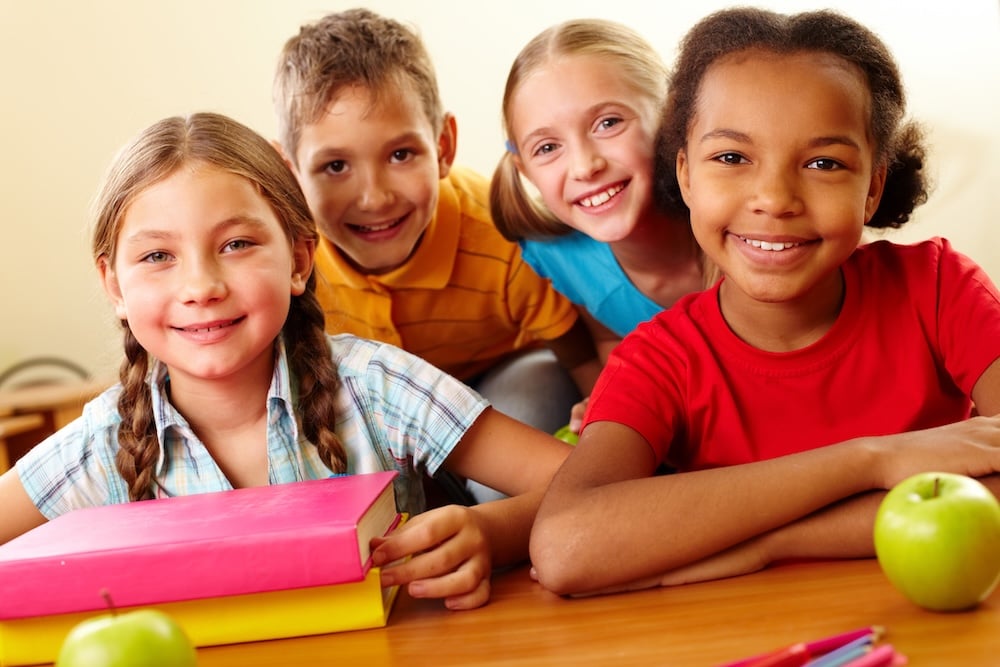
In every classroom, kids are learning more than math and reading. They’re learning how to be in community with others—how to take turns, share space, speak up, and sometimes, how to reach out even when it’s uncomfortable.
One of the most meaningful social-emotional lessons we can teach is how to include others, not just when it’s easy, but especially when it’s hard. Whether students are navigating friendship cliques, peer pressure, or just unfamiliarity, they need tools and support to practice compassion and inclusion with courage.
In this article, we’ll explore how to build an inclusive classroom environment, how to talk about the importance of including others, and how to help students build the emotional resilience to extend kindness, even in moments of tension or discomfort.
Why Inclusion Isn’t Always Easy—for Adults or Kids
When we talk about inclusion, it’s important to name the reality: kids sometimes struggle to include others because they’re trying to figure out where they belong.
Exclusion might show up as:
- Ignoring someone different
- Leaving classmates out of games or group work
- Going along with a clique to avoid being excluded themselves
These behaviors don’t mean kids are unkind. They often mean they’re navigating their uncertainty and doing their best to fit in. That’s why creating inclusive cultures in classrooms means teaching not just the what of inclusion, but the how and the why.
What Is an Inclusive Learning Environment?
An inclusive learning environment is a space where every student feels valued, safe, and supported, regardless of their background, ability, identity, or experience. In these spaces:
- Differences are celebrated, not tolerated
- Students are taught to speak up for one another, not over one another
- Teachers model inclusive practices in how they speak, lead, and guide conflict
At Soul Shoppe, our work is rooted in inclusive classroom strategies that give children the language and tools to choose connection over division.
Values-Based Teaching: Including Others Starts from Within
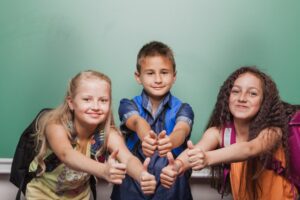 When it comes to helping kids include others, it’s not just about changing behavior. It’s about growing character. That’s why we teach from a values-based approach—centering around empathy, responsibility, and kindness.
When it comes to helping kids include others, it’s not just about changing behavior. It’s about growing character. That’s why we teach from a values-based approach—centering around empathy, responsibility, and kindness.
A few simple ways to root inclusion in your classroom values:
- Create a class agreement together that includes how you treat people who feel left out
- Talk openly about fairness, friendship, and listening across differences
- Share stories (real or fictional) where someone chose to include others, and what happened as a result
This builds an inclusive culture in schools from the inside out—not by rules, but by relationships.
Inclusive Strategies in the Classroom That Make a Difference
Ready to make it real for students? These inclusive strategies in the classroom are powerful starting points.
1. Practice Circle Time Conversations About Inclusion
Use open-ended questions like:
- “When have you felt left out? How did it feel?”
- “What’s something kind someone did for you that made you feel included?”
- “What can we do when we see someone sitting alone or being left out?”
This opens the door for vulnerability and empathy-building.
2. Model and Celebrate Moments of Inclusion
When you see students including others, name it out loud:
- “I noticed you invited her into your group. That shows kindness and leadership.”
- “You let him take a turn even though you didn’t know him well—that’s what community looks like.”
Naming these actions reinforces an inclusive classroom environment through affirmation, not correction.
3. Create Safe Ways for Kids to Speak Up
Sometimes, including others means standing up to a friend. Give students tools to navigate this through role-play and scripts like:
- “Let’s make room for them, too.”
- “I think we should all get a turn.”
- “I feel better when we don’t leave people out.”
This fosters peer-led inclusion and challenges peer pressure in healthy ways.
Activities to Help Kids Include Others
Try these simple classroom culture-building activities that focus on connection and collaboration:
- Partner Switch Ups: Regularly rotate seating or group work so students practice engaging with different classmates
- Compliment Chains: Pass a compliment from one student to the next, encouraging noticing and naming others’ strengths
- “Who’s Not Here Yet?” Game: In group games or class activities, ask students to scan the room and invite anyone not yet included
Each of these is a small but meaningful way to teach what it means to be part of a shared community.
Inclusion Is Emotional Work—SEL Helps Guide the Way
Choosing to include someone can take courage. That’s where social emotional learning makes the biggest impact. When students learn how to name their feelings, navigate discomfort, and care about others, inclusion becomes more than a rule—it becomes a natural response.
Programs like Soul Shoppe’s Tools of the Heart teach emotional awareness and give students language for conflict, empathy, and communication. These tools create space for even the hardest conversations, like when a student feels left out or when a group realizes they have excluded someone unintentionally.
Creating the Culture, Every Day
Inclusion doesn’t happen in one lesson. It’s built day by day, in classroom routines, hallway greetings, partner projects, and recess choices.
When we teach kids how to include others—even when it’s uncomfortable—we’re showing them how to live their values. How to be brave and kind at the same time. How to shape a world that makes room for everyone.
And that starts with us.
You May Also Like:
Respect Differences
Tolerance vs. Acceptance
Teaching Kids Forgiveness
Teaching Diversity in the Classroom





 Often, aggressive communication is a reaction to strong emotions like anger, embarrassment, or fear. When we address the emotion underneath, we can support students in shifting from reactivity to intention.
Often, aggressive communication is a reaction to strong emotions like anger, embarrassment, or fear. When we address the emotion underneath, we can support students in shifting from reactivity to intention.




 When it comes to helping kids
When it comes to helping kids